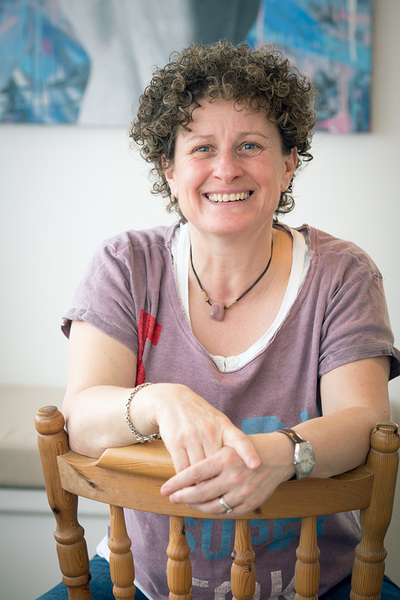
Ashleigh Walker has a great best friend and a cute new boyfriend, but the rest of her life is a mess. Falling behind in school and dealing with her parents’ messy divorce leave her feeling stranded—until she’s unexpectedly rescued by a cool new English teacher. Miss Murray is young, smart, reads aloud poems with dirty words in them and seems to really see Ash at a time when she’s feeling especially isolated. In Read Me Like a Book, things get complicated when Ash’s admiration turns into head-over-heels first love, forcing her to reconsider who she is and what she really wants. British author Liz Kessler, best known for her Emily Windsnap series for middle grade readers, first wrote Read Me Like a Book more than 10 years ago. At that time, U.K. law Section 28 prohibited the distribution of books that promoted a homosexual lifestyle, particularly in a school setting, and so Kessler set the manuscript aside. Years later, Kessler's first YA book is finally being published. We asked the author a few questions about love, coming out and literature. What does it mean to you that this book is finally being published? It’s almost hard to put into words. It means kind of everything. It means that the world has moved on; it means that people are more accepting of difference; it means the YA book world is FANTASTIC; it means celebration, communication and openness; it means I am talking to young people directly from my heart and telling them that they can be happy to be who they are. Like I said, pretty much everything! I like that you make it very clear this story isn’t about you. That being the case, why did you want to write a teen coming-out story? Well, it was the first book that I wrote, and whilst it isn’t any more my story than any of my other books, it was strongly influenced by my thoughts about coming out myself. I wanted to write something that told a story I wanted to tell. I wanted to put a story about coming out into the world. I guess underneath that, I am sha********* retty much all of my books: be true to yourself; be good to your friends and your family; be brave; accept difference. I suppose these are the things that are in my heart, and whether I’m writing about mermaids or fairies or emerging lesbians, they seem to be the messages that my heart keeps wanting to share! While it’s not without a bittersweet moment or two, I love that Ash’s coming out is generally a happy occasion; the few YA novels available in my youth were not that way at all. Was it a deliberate choice to keep things gentle? If so, why? Sort of. I’m not a writer who sets out to shock or upset. In my books (and in my life) I like resolution, I like endings that feel at least full of hope and promise. In my youth, I remember that in the few books with LGBT characters that were around, many of them were quite depressing or negative in some way—and I very much wanted to go against that. I wanted this book to be as much a celebration of identity and difference as anything else. As Ash moves closer to being honest about who she is, she moves away from an old friend who’s a bit wild toward a new one who is slightly nerdy (no disrespect, Robyn!). Do you think some people still equate a coming-out journey with movement in the opposite direction—moving toward wildness? Did you intentionally subvert that model? Gosh. Interesting question. I’d like to act all intellectual and say, “Oh yes, sure I intentionally did that.” But I didn’t! If anything, I think what I was doing was showing that Ash was moving towards a deeper understanding of herself instead of always acting out the stuff on the outside. And that when she did this, as well as uncovering her sexuality, what she also found inside was someone who had more honest dreams and ambitions than she’d let herself admit to previously. Ash is adjusting to a lot of new normals: preparing for university and also dealing with her parents’ break-up. Does that tension heighten her attraction to Miss Murray? In some ways, yes, these things heighten her attraction because Miss Murray becomes almost like a beacon of positive light in Ash’s life, when everything else seems to be falling apart. It’s not that she wouldn’t feel the attraction without the other issues that are going on in her life—but because of them, the contrast between the bad and good sides of her life is made stronger, and so this does intensify her feelings. Miss Murray gets the class’ attention when she reads a poem with the F-word in it; I had a substitute in elementary school who did the same thing with a history lesson, and it’s such a big deal when it happens! Why does that make such a strong impression on kids? Web/Link: super smash flash 2.
Location: 7940 Paris Creek Road, Strathalbyn SA, Australia
N/A
When you call, Don't forget to mention ADSCT whenever you will call to user. Be safe during payment.